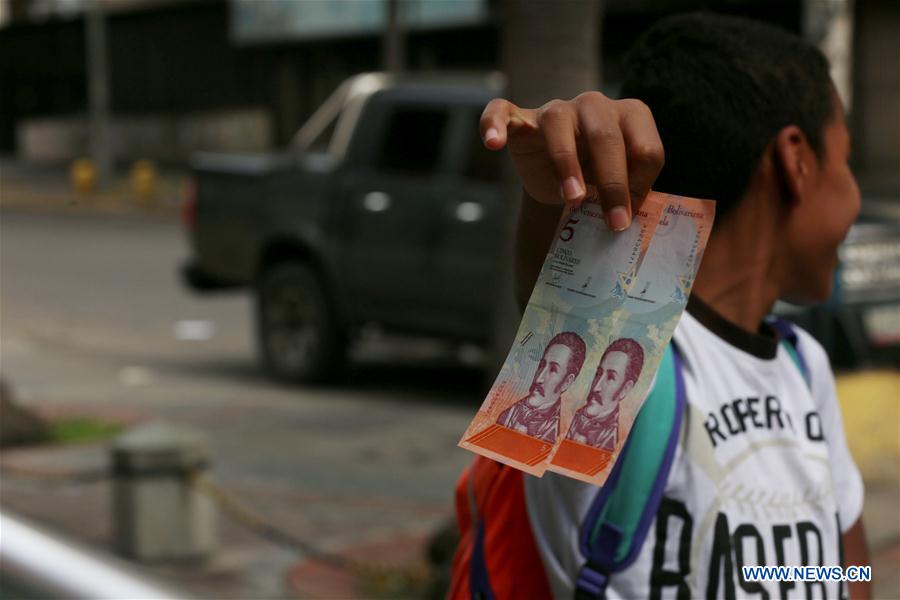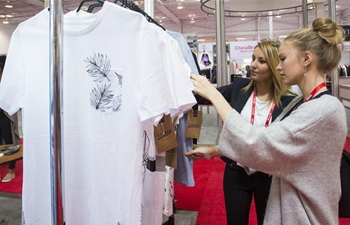
A person shows the new "sovereign bolivar" bills in Caracas, Venezuela, on Aug. 20, 2018. Venezuelans welcomed the introduction of new banknotes on Monday with a mixture of hope and anticipation as to how the move will affect prices. The new "sovereign bolivar" aims to simplify monetary transactions by lopping off five zeros from the bolivar, which will be taken out of circulation. (Xinhua/Gregorio Teran/AVN)
by Willey Penuela
CARACAS, Aug. 20 (Xinhua) -- Venezuelans welcomed the introduction of new banknotes on Monday with a mixture of hope and anticipation as to how the move will affect prices.
The new "sovereign bolivar" aims to simplify monetary transactions by lopping off five zeros from the bolivar, which will be taken out of circulation.
To ease the transition, President Nicolas Maduro declared Monday a national holiday, giving Venezuelans a chance to unhurriedly adapt to the new bills.
Near the capital's Plaza Venezuela, Carmen Gonzalez, a nurse, expressed what many residents appeared to be thinking, saying she would take a wait-and-see attitude.
"We are hopeful that things will improve a little bit. We will have to wait and see how prices are this afternoon or tomorrow morning, because today, almost everything is closed," Gonzalez said.
The redenomination of the currency is one of a series of measures the government is taking to help the country's battered economy recover from recent blows, including plummeting oil prices and U.S. economic and financial sanctions, both of which have depleted reserves.
To bolster the sovereign bolivar, the government tied its value to Venezuela's cryptocurrency the petro, which is backed by the country's rich oil and mineral reserves.
Venezuelans were most apprehensive about the new currency's impact on pricing.
At one of the few bakeries that were open, manager Alfredo Mata said eliminating zeros from the currency "has generated a certain amount of confusion among people who are trying to figure out prices.
"When you say something costs 30 sovereign bolivars, almost no one understands, or they ask you to say it in millions" as consumers were doing before the switch, he said with a laugh.
"It's a matter of getting used to it, little by little," added Mata.
Customer Jose Antonio Casanova noted prices were the same as they were last week.
"It's necessary for prices to remain the same for a while so that our money can buy a little bit more. I don't agree with the government but there is a need for balance so the situation doesn't become unmanageable," Casanova said.
To ensure business owners don't use the transition as an excuse to raise prices, Maduro issued a warning during a Facebook live event on Sunday.
"Attention everyone who is thinking of going crazy repricing things: be careful," Maduro said.
"On Tuesday (Aug. 21) we will be publishing a list of all the prices so that people will know what they are and be able to speak out," he said.
Maduro added his economic team is trying to guarantee that the price of the basic basket of goods remains below the new minimum wage taking effect on Sept. 1.
The new minimum wage of 1,800 sovereign bolivars, equivalent to 180 million old bolivars, represents a 3,000 percent increase.
In spite of uncertainty over the new economic measures, average Venezuelans are keeping their sense of humor intact.
Carlos Raul Hernandez, owner of a tire repair shop, said his business was open because tires don't seem to understand whether it's a working day or a holiday.
"They get damaged and that's that," he said with a smile.
When asked which currency he was accepting, Hernandez jokingly said, "we accept petros."















